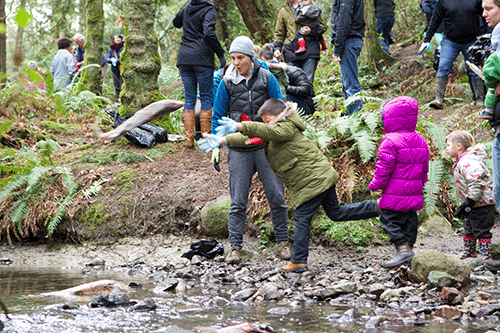Leave a Legacy for Wild Salmon Stewards
Empowered communities play a pivotal role in wild salmon conservation. That’s why supporting volunteers trained in the science of grassroots stewardship is a mainstay of the Pacific Salmon Foundation’s activities. Every time you donate to the Community Salmon Program, your dollar generates another seven dollars, on average, for local salmon projects. In 2018, grants totaling $1.66 million to 204 projects in 87 different communities were awarded. But, the total value of those projects including leveraging at the local level was almost $10 million. Grants from our Community Salmon Program provide seed funding, attract other donors, and bring communities and all levels of government together in concerted efforts for salmon. Meet some of the volunteers that PSF donors supported in 2018.
Contact Margaret Buttner at mbuttner@psf.ca or 604 664 7664 ext. 128 about supporting volunteer streamkeepers in your community.’
Prince George: Engaging Community
SWCA members installed these signs funded by PSF to discourage poaching on a local salmon spawning salmon stream.
Prince George isn’t necessarily the first place in British Columbia where people think of salmon habitat and education, but volunteers at the Spruce City Wildlife Association are working hard to change that. When Dustin Snyder, vice president of the association, joined in 2014, one of the first things he asked about was the dormant hatchery attached to their building on the Nechako River. Their local DFO community advisor suggested they apply for funding from PSF’s Community Salmon Program to replace damaged and missing equipment to restart operations. Says Dustin: “those early PSF grants gave us the confidence we needed to pursue more projects and look at our facility as a salmon stewardship centre and not just a hatchery.”
One of their goals is to demonstrate how the Nechako River connects to the Fraser watershed and ultimately the Pacific Ocean. Their most popular display, partly funded by PSF, is their saltwater tank; the starfish, in particular fascinate the children who visit the Centre. Volunteers host thousands of visitors each year including students in the Fisheries and Oceans Canada “Stream to Sea” education program and the annual fry release has become a major community event.
To date, the Spruce City Wildlife Association has benefitted from seven Community Salmon Program grants of $26,111 for projects valued at $90,828 including community leveraging.
Saanich: Tossing Salmon Carcasses and Protecting an Urban Creek
Friends of Mount Douglas Park Society hosts an annual chum carcass toss to introduce nutrients to the local ecosystem.
Few things bring a bigger smile to Society president Darrell Wick’s face than the sight of young children tossing frozen salmon carcasses into Douglas Creek each winter. The carcasses come from the nearby Howard English Hatchery and provide valuable nutrients for the creek and surrounding parkland. This is just one example of how Friends of Mount Douglas Park Society volunteers are restoring and protecting the creek that flows through the 200-hectare regional park on the Saanich Peninsula near Victoria.
The Park is surrounded by urban development leaving the creek vulnerable to storm surges during heavy rains. Fortunately, grants from PSF’s Community Salmon Program have enabled volunteers to recreate spawning beds by bringing in gravel and woody debris to protect small fry that are also provided by the hatchery. Riparian plantings on the banks of the creek have helped stop soil erosion – all installed by volunteers including a local Scout troop. Says Darrell: “our goals are two-fold – salmon restoration and public education. We couldn’t do projects like these without CSP funding. The grants give us financial leverage to access more funds, and PSF’s endorsement of our projects is equally important in the eyes of our funders.”
To date, the Friends of Mount Douglas Society has benefitted from 18 Community Salmon Program grants of $102,607 for projects valued at $698,864 including community leveraging.
Mount Currie: Stewarding a Cultural Icon and Ancestral Food Source

For Maxine Bruce and the Lil’wat Nations, salmon are crucial for sustenance and cultural identity.
Ask Maxine Bruce what her favourite part of salmon stewardship is and she’s quick to say: “salmon bring people together in the most positive way.”
Maxine is a member of the Lil’wat Nation in Mount Currie, British Columbia. She has been employed by the Lil’wat Nation since 2005, and involved with fisheries management for several years. Together with her team of volunteers, they see themselves as stewards of their land – its geography and natural resources, including Birkenhead River salmon. Sockeye, Coho and Chinook play a vital role in her community for sustenance and cultural identity, while Birkenhead Chinook support the Southern Resident Killer Whales. Her team has received a number of Community Salmon Program (CSP) grants from the Pacific Salmon Foundation to support education, outreach, stock assessment and habitat rehabilitation. Their most recent CSP grant will assist with Birkenhead River bank stabilization where the river runs adjacent to Highway 99. Over time, significant erosion has taken place; the funds will help redirect the river away from the highway by adding riparian (stream-side) plants to the banks to hold the soil. The group will also add large tree stumps and woody debris in the river to create protective habitats for juvenile salmon.
Says Maxine: “CSP grants encourage us to look to our own community for support – we ask how can volunteers contribute to the project and in the process, further salmon education among the children and youth in our community.”
To date, the the Lil’wat Nation has benefitted from 12 CSP grants totaling $256,231 for projects valued at $627,061 including community leveraging.





